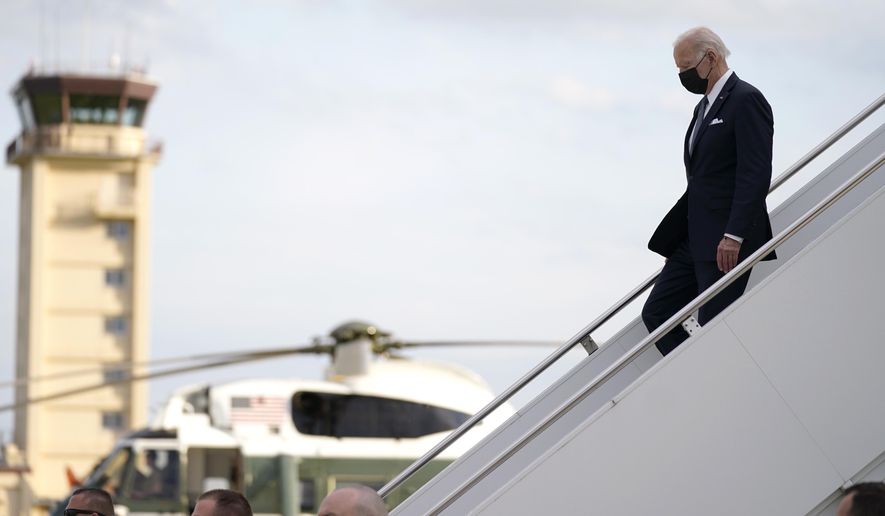President Biden arrived Sunday in Japan for the second leg of his trip to Asia, where he is expected to reaffirm Washington’s close relationship with Tokyo and attend a summit of the “Quad” — Australia, Japan, India and the U.S. — to counter China’s economic and military coercion in the region.
The visit to Japan marks Mr. Biden’s first trip there as president. On Monday, he will announce the Indo-Pacific Economic Framework (IPEF), his administration’s attempt to cobble together a replacement for the Trans-Pacific Partnership trade agreement that then-President Trump pulled out of.
Beijing has criticized the new framework, calling it a “closed club” that should be open to everyone in the Asia Pacific region, including China.
“It’s natural that they’re going to try to find ways to raise questions. In this particular case, it’s just flatly untrue to call IPEF closed. It is by design and definition an open platform,” National Security Adviser Jake Sullivan said Sunday. “We do expect, in addition to the countries that join for the launch tomorrow, others will come along in the months and years ahead.”
However, China will likely be happy that one Asian economic powerhouse — Taiwan — will not be part of the launch of the Indo-Pacific Economic Framework.
“But, we are looking to deepen our economic partnership with Taiwan, including on high-technology issues — including semiconductors and supply chains,” Mr. Sullivan told reporters on Air Force One. “We’re pursuing that … on a bilateral basis while we work with a range of other countries through the framework.”
SEE ALSO: Pentagon chief Lloyd Austin to host Ukraine working group meeting on Monday
The agreement itself will not address maritime security concerns in the region. Mr. Sullivan said the framework is not a security agreement.
“It’s an economic arrangement focused around the further integration of Indo-Pacific economies, setting of standards and rules, particularly in new areas like the digital economy, and also trying to ensure that there are secure and resilient supply chains,” he said.
On Monday, Mr. Biden is scheduled to meet Japanese Emperor Naruhito at the Imperial Palace in Tokyo before holding his first in-person bilateral summit with Prime Minister Fumio Kishida. They are expected to affirm that their countries will work together to counter North Korea’s stepped-up nuclear and missile provocations.
Retired Navy Adm. Mike Mullen, former chairman of the Joint Chiefs, said Sunday on ABC’s “This Week” that dealing with Pyongyang over its nuclear program is “deja vu all over again.”
“The solution here must go through Beijing and our relationship with China is worsening. That makes solving this more difficult,” Adm. Mullen said. “I think the president’s visit, in that regard, is very critical: to try to contain what continues to be a real challenge in North Korea with his development in nuclear weapons.”
On Saturday, Mr. Kishida told reporters that he wants to have “frank, in-person” discussions with Mr. Biden on a variety of issues, such as regional security, climate change and nuclear disarmament.
Both leaders are expected to reaffirm the policy to continue to impose heavy sanctions on Russia and provide continued support for Ukraine, along with calling for cooperation from other Asian nations, according to the Japanese broadcaster NHK.
Mr. Kishida, 64, took office in October. He is the second Japanese prime minister of the Biden administration. His predecessor, Yoshihide Suga, was forced to step down over public dissatisfaction about how his government handled the COVID-19 pandemic in Japan.
• Mike Glenn can be reached at mglenn@washingtontimes.com.




Please read our comment policy before commenting.